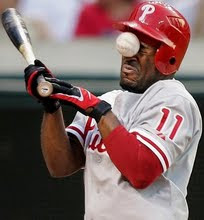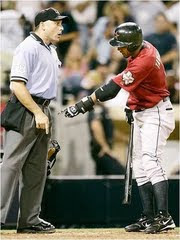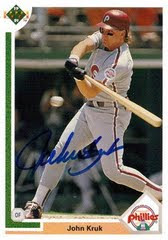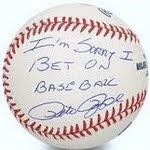Today, December 8, is the one-year anniversary of the creation of the Game Of Inches blog. We began our blog with a mission: "to prove that God doesn't exist and that athletes are merely cold, metal machines with no souls or heart." With the then-recent death of FireJoeMorgan.com and an ever growing appreciation of the deeper stories in baseball -- those told below the surface of Batting Average and ERA --we started a blog to join the realm of sabermetrics fans everywhere and help penetrate the myths, while often trying to be funny and relevant along the way.
It all began with a single post, written late one night, following a heated argument with a friend about whether or not Tom Glavine deserved to be in the Hall of Fame. Though we were then-inexperienced in the ways of FIP and wOBA and the likes, we still knew of the importance of strikeouts, walks, home runs and the gallimaufry of hits, total stolen bases, wins and ERA. From that post sprung many more and today we at Game Of Inches sit proudly today, exactly 1,200 posts later, having grown from nothing into what we are today. We would proudly like to thank you, the 400+ readers who visit this site daily, and Google Images, for making us the #1 search result for "lesbians."

It is only fitting that in honor of our anniversary and first post that I follow it up by expounding upon a question I raised in passing 365 days ago: why is Bert Blyleven not in the Hall Of Fame?
In the long, traditional and tainted history of baseball, you will find few players who were as good as Bert Blyleven. A pitcher who spent 86% of his career in the AL, Blyleven was not only one of the most durable pitchers to ever play the game (14th all time in innings pitched), but he also played each and every one of those innings, up until the last few years of his career, remarkably well and consistently. Blyleven was not just "good" at baseball, he was nothing short of great, and unlike Javier Vazquez, he did not underperform his stellar peripherals.
In terms of the topical, traditional and irrelevant statistics, Blyleven's career 3.31 ERA puts him in company with current/future Hall Of Famers Randy Johnson (career 3.29 ERA), Fergie Jenkins (career 3.34 ERA), Phil Niekro (career 3.35 ERA), and Robin Roberts (3.41 ERA). His ERA is also lower than that of Tom Glavine (career 3.54 ERA). You like wins? His 287 wins are give him one more than Robin Roberts, and makes him 27th all time. Only six other players in the history of baseball who have more wins than Blyleven (Tommy
 John (288), Bobby Mathews (297), Randy Johnson (303), Tom Glavine (305), Roger Clemens (354), and Greg Maddux (355)) are not currently in the hall of fame, and five years from now, that number will dwindle down to two. Many pitchers with less wins are already in. Furthermore, Blyleven was never known as a jerk or cheater or drug user like Albert Belle, Ron Santo, Tim Raines, Kenny Rogers, Barry Bonds, Roger Clemens, et al. (to the contrary,he has a good sense of humor). But wins don't really matter, attitude has nothing to do with talent and production on the field, and a career ERA may tell much about a pitcher's success over the years, but it does not necessarily showcase a pitcher's true talent (see Javier Vazquez). However, these are three of the most common factors by which voters approve or deny players into the Hall Of Fame. How Blyleven, who performed remarkably well in his surface stats and other irrelevant, but considered aspects of the game is not given due credit (he only got the nod from 62.7% voters last year) is downright puzzling.
John (288), Bobby Mathews (297), Randy Johnson (303), Tom Glavine (305), Roger Clemens (354), and Greg Maddux (355)) are not currently in the hall of fame, and five years from now, that number will dwindle down to two. Many pitchers with less wins are already in. Furthermore, Blyleven was never known as a jerk or cheater or drug user like Albert Belle, Ron Santo, Tim Raines, Kenny Rogers, Barry Bonds, Roger Clemens, et al. (to the contrary,he has a good sense of humor). But wins don't really matter, attitude has nothing to do with talent and production on the field, and a career ERA may tell much about a pitcher's success over the years, but it does not necessarily showcase a pitcher's true talent (see Javier Vazquez). However, these are three of the most common factors by which voters approve or deny players into the Hall Of Fame. How Blyleven, who performed remarkably well in his surface stats and other irrelevant, but considered aspects of the game is not given due credit (he only got the nod from 62.7% voters last year) is downright puzzling.Below the very quality surface stats, however, you find an even more impressive skill set. Bert Blyleven ended his career with a 3.19 FIP over almost 5,000 innings pitched, making him top 50 all time amongst starting pitchers who threw 2500+ innings. A 3.19 FIP puts Blyleven in
.jpg) company with such current/future Hall Of Famers as Steve Carlton (career 3.15 FIP) and Jim Bunning (3.22 FIP) and ahead of such guys as Don Sutton (career 3.24 FIP), Greg Maddux (career 3.26 FIP), Fergie Jenkins (3.28 FIP), Dennis Eckersley (career 3.40 FIP), and Phil Niekro (career 3.60 FIP). In fact, Blyleven's FIP was only above 3.00 twice during his first ninemajor league seasons (one of which was his rookie year). Over those first nine years of his career, his career high FIP was 3.27. In his career, his FIP was above 4 only three times. His BB/9 was only three times above 3.00 in a season and only once above 3.50. Blyleven's K/9 (6.70 career) was also above average each season until his final three in the majors. With the exception of his final three seasons -- over which Blyleven's K/BB was 2.98, 2.76, and 2.41 -- Blyleven's K/9 was never below 6.0.
company with such current/future Hall Of Famers as Steve Carlton (career 3.15 FIP) and Jim Bunning (3.22 FIP) and ahead of such guys as Don Sutton (career 3.24 FIP), Greg Maddux (career 3.26 FIP), Fergie Jenkins (3.28 FIP), Dennis Eckersley (career 3.40 FIP), and Phil Niekro (career 3.60 FIP). In fact, Blyleven's FIP was only above 3.00 twice during his first ninemajor league seasons (one of which was his rookie year). Over those first nine years of his career, his career high FIP was 3.27. In his career, his FIP was above 4 only three times. His BB/9 was only three times above 3.00 in a season and only once above 3.50. Blyleven's K/9 (6.70 career) was also above average each season until his final three in the majors. With the exception of his final three seasons -- over which Blyleven's K/BB was 2.98, 2.76, and 2.41 -- Blyleven's K/9 was never below 6.0.Blyleven's numbers are so good because his control was superb. It was not Greg Maddux like, but his career 2.39 BB/9 is none the less fantastic. Blyleven posted a career 2.80 K/BB mark, which is top 35 amongst all pitchers who threw 2000+ innings (top 25 amongst all pitchers with 2500+ innings). And just in case Blyleven's career 2.80 K/BB does not sound sweet enough, between 1970 and 1992, the league average K/BB was only above 1.75 once (1988).
Fangraphs does not have any groundball data available for any season prior to 2002, but it is well known that Blyleven had a fantastic curveball and he kept the ball in the yard plenty with a 0.78 HR/9.
In sum, we have the portrait of a pitcher with great peripherals and quality surface stats.
 Blyleven was an almost entirely AL pitcher with a good reputation, a lot of wins, great control (in terms of both BB/9 and K/BB), and a very quality FIP and ERA. His 3,701 career strikeouts are fifth all time and he's better than many of the pitchers who are already honored (some of whom should not be...) in the halls of history in Cooperstown, NY. Blyleven was one of baseball's true greats and he is for some befuddling reason (perhaps it's the superfluous lack of 300 wins or the fact that Joe Morgan hates all non-Joe Morgan players) overlooked every year.
Blyleven was an almost entirely AL pitcher with a good reputation, a lot of wins, great control (in terms of both BB/9 and K/BB), and a very quality FIP and ERA. His 3,701 career strikeouts are fifth all time and he's better than many of the pitchers who are already honored (some of whom should not be...) in the halls of history in Cooperstown, NY. Blyleven was one of baseball's true greats and he is for some befuddling reason (perhaps it's the superfluous lack of 300 wins or the fact that Joe Morgan hates all non-Joe Morgan players) overlooked every year.Blyleven still has a handful more years upon which his name will appear on the annual HOF ballot, but time is running out. The world of baseball needs to take a second look at Blyleven's career before it's too late and hopefully, in the process, the world of baseball will also catch notice of the career of Mike Mussina.







0 comments:
Post a Comment